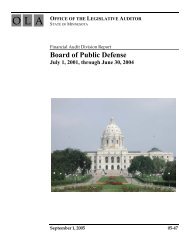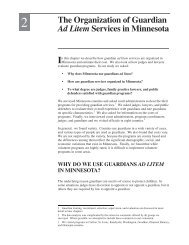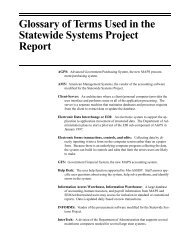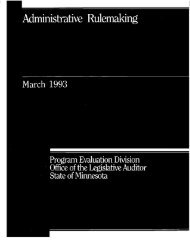Full Report (PDF) - Office of the Legislative Auditor
Full Report (PDF) - Office of the Legislative Auditor
Full Report (PDF) - Office of the Legislative Auditor
- No tags were found...
Create successful ePaper yourself
Turn your PDF publications into a flip-book with our unique Google optimized e-Paper software.
56MOTOR VEmCLE DEPUTY REGISTRARSsimilar for public and private deputies. While our study did not address all aspects<strong>of</strong> customer service, it suggests that o<strong>the</strong>r factors, such as size <strong>of</strong> deputy, are moreimportant than whe<strong>the</strong>r <strong>the</strong> deputy is private or public. For example, we foundwaiting times tended to be considerably longer at large deputies than at smalldeputies.The existence <strong>of</strong> private deputies, by itself: does not automatically bring <strong>the</strong> benefitscommonly associated with private enterprise. Private deputies do not bringlower prices to consumers because, under <strong>the</strong> current system, <strong>the</strong>re is no pricecompetition. The state sets all administrative fees and prohibits deputy registrarsfrom charging a lower fee. Private deputies may be more efficient than publicdeputies, but that does not necessarily help <strong>the</strong> public under <strong>the</strong> protective regulations<strong>of</strong> <strong>the</strong> state. Under <strong>the</strong> current system, replacing a public deputy with a privatedeputy helps Minnesota citizens economically only if <strong>the</strong> public deputy islosing money.We did not findevidence thatan all-privateor an all-publicsystem wouldbe better than<strong>the</strong> currentsystem.IState regulations also limit competition by strictly controlling <strong>the</strong> fonnation <strong>of</strong>new deputy registrars, separating <strong>the</strong>m geographically, and restricting advertisements.If a deputy provides mediocre service, it still may keep most <strong>of</strong> its customersbecause, unlike most <strong>of</strong> <strong>the</strong> private sector, nobody can move into its area andcompete head-to-head.In conclusion, we did not find empirical evidence that ei<strong>the</strong>r an all-public or an allprivatesystem would be better than <strong>the</strong> current system. To improve <strong>the</strong> system,we think <strong>the</strong> focus should be on how to make <strong>the</strong> system more responsive to <strong>the</strong>customer, ei<strong>the</strong>r in <strong>the</strong> fonn <strong>of</strong> lower costs or better service.There are many options for reducing costs or improving customer service. We discuss<strong>the</strong>se in <strong>the</strong> following sections on fee policy and state regulation.FEE POLICYIn Chapter 3, we found that large and medium-large deputies tend to do well financially,although some large public deputies just break even or lose money. Mostsmall public deputies lost money and small private deputies earned relatively lowincomes. In Chapter 1, we showed that most states have lower administrative feesthan Minnesota. However, an across <strong>the</strong> board reduction in Minnesota's feeswould impose an additional hardship on small deputies, which may jeopardize accessin small communities.O<strong>the</strong>r states use a variety <strong>of</strong> approaches to deal with this problem. A few statesvary <strong>the</strong> fee according to <strong>the</strong> number <strong>of</strong> transactions an agent processes. Ohiouses a bidding system to award two-year contracts. Presumably, agents in largemetropolitan areas would make lower bids than in small towns. Some states allowagents to set <strong>the</strong>ir own fee within a specified range. Finally, a few states let countiesdetennine fees for agents in <strong>the</strong>ir county.








